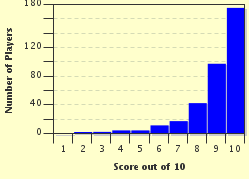Quiz Answer Key and Fun Facts
1. The rain cycle consists of three processes. Assuming we begin with water that is already on the ground, what is their correct order?
2. Turning towards geology. Which of the following is not a real kind of rock?
3. I hope this is not a brain-boggling question. What are the three main parts of brain known as?
4. Some jerks and bumps are ahead. With what instrument can we measure the intensity of an earthquake?
5. A chemistry question, now. If a solid changes directly to gaseous state without turning into liquid state, what is this change called?
6. Don't freak out. I don't want the answer to this calculation, but can you tell me what instrument I can use if I want to calculate 536544222467*123456555556*5443677889?
7. Now, some physics. What scale among the following can not be used for measuring temperature?
8. There is nothing better than a sip of fresh water. How can impurities in water be removed?
9. Now, don't be afraid, and simply answer this: x+y=8 is an example of what kind of mathematical problem?
10. Ending with a little biology. Which component of blood helps us to fight infections?
Source: Author
remote9
This quiz was reviewed by FunTrivia editor
NatalieW before going online.
Any errors found in FunTrivia content are routinely corrected through our feedback system.

